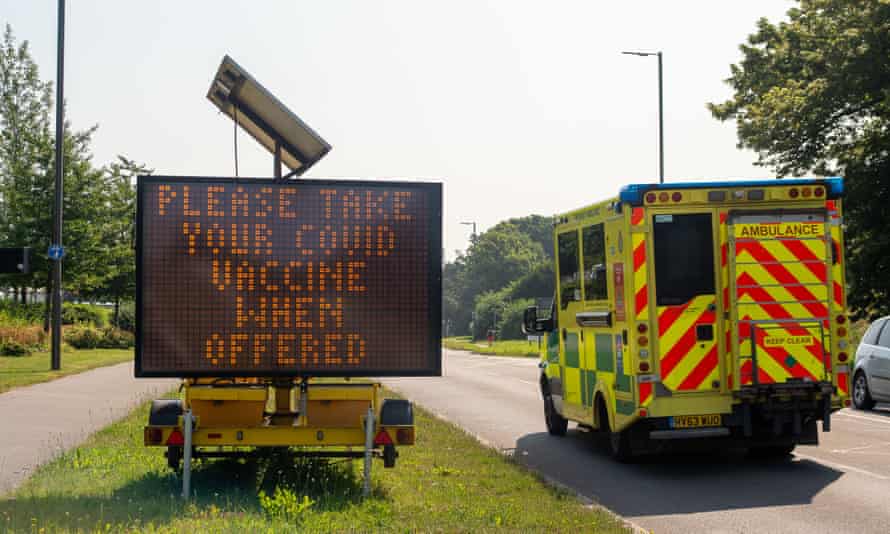Delta variant doubles risk of hospitalisation, new study finds
Outbreak of Delta Covid cases likely to put strain on health services in areas with low vaccination rates, experts say

The Delta variant doubles the risk of Covid hospitalisation compared with the previously dominant Alpha variant, a new study focused largely on unvaccinated or partially vaccinated people has found.
The analysis – based on data collected in England – suggests that outbreaks of the Delta variant are likely to put an additional strain on health services, particularly in places with low rates of vaccination.
The Delta variant, first identified in India, is already understood to be far more infectious than the previously dominant Alpha variant that was initially detected in Kent. This analysis underscores Delta’s ability to put people in hospital once infected, especially those who have not been vaccinated.
In the study, researchers analysed healthcare data from 43,338 Covid-19 cases in England between 29 March and 23 May 2021. Only 1.8% of the cases, regardless of variant, had received both doses of the vaccine, 24% had been vaccinated once and the majority (74%) were unvaccinated.
About one in 50 patients were admitted to hospital within 14 days of their first positive Covid test – 2.2% of Alpha cases vs 2.3% of Delta cases, the study found. However, after accounting for key factors such as age, ethnicity and vaccination status, the researchers found the risk of being admitted to hospital was more than doubled with the Delta variant compared with the Alpha variant (a 2.26-fold increase in risk), according to the paper published in the Lancet journal.
“This study confirms previous findings that people infected with Delta are significantly more likely to require hospitalisation than those with Alpha, although most cases included in the analysis were unvaccinated,” said Dr Gavin Dabrera, one of the study’s lead authors and a consultant epidemiologist for Public Health England.
“We already know that vaccination offers excellent protection against Delta and as this variant accounts for more than 98% of Covid-19 cases in the UK, it is vital that those who have not received two doses of vaccine do so as soon as possible.”
The researchers cautioned that the data could not be used to draw conclusions about how hospitalisation risk differs between vaccinated people who have been infected with either Delta or Alpha, given the small numbers of fully vaccinated people in the study.
In the study, samples of the virus taken from patients underwent whole genome sequencing to confirm which variant had caused the infection. Overall during the study period about 80% of the cases were attributed to Alpha, while the remainder were linked to Delta. However, in the final week of the study, Delta accounted for two-thirds of cases as the variant rose to dominance.
Previous research has generated similar findings. On the basis of PCR test results that determined the variant by testing for a specific gene that is more common in the Delta variant, early data from Scotland also pointed to a more than twofold higher risk of hospitalisation for those infected with the Delta variant compared with the Alpha variant.
Dr Anne Presanis, one of the study’s lead authors and senior statistician at the MRC Biostatistics Unit at the University of Cambridge, said the study’s findings highlighted the importance of vaccination.
It is already known that Delta is far more infectious, and this latest robust analysis has now confirmed that once infected, people are more likely to be hospitalised, noted Dr Peter English, a retired consultant in communicable disease control and the former chair of the British Medical Association’s public health medicine committee, who was not involved in the study.
Since most restrictions have been lifted – even with high vaccination rates – cases are on the rise and will probably climb higher as schools and universities reopen, he suggested, noting that the government’s roadmap to reopening was predicated on the Alpha not the Delta variant.
“The plans were not updated or changed to reflect the considerably higher risk posed by the Delta variant,” he noted. “And that strikes me as … wishful thinking on behalf of not very clever politicians, frankly.”
… as you're joining us from Taiwan, we have a small favour to ask. Tens of millions have placed their trust in the Guardian’s high-impact journalism since we started publishing 200 years ago, turning to us in moments of crisis, uncertainty, solidarity and hope. More than 1.5 million readers, from 180 countries, have recently taken the step to support us financially – keeping us open to all, and fiercely independent.
With no shareholders or billionaire owner, we can set our own agenda and provide trustworthy journalism that’s free from commercial and political influence, offering a counterweight to the spread of misinformation. When it’s never mattered more, we can investigate and challenge without fear or favour.
Unlike many others, Guardian journalism is available for everyone to read, regardless of what they can afford to pay. We do this because we believe in information equality. Greater numbers of people can keep track of global events, understand their impact on people and communities, and become inspired to take meaningful action.
We aim to offer readers a comprehensive, international perspective on critical events shaping our world – from the Black Lives Matter movement, to the new American administration, Brexit, and the world's slow emergence from a global pandemic. We are committed to upholding our reputation for urgent, powerful reporting on the climate emergency, and made the decision to reject advertising from fossil fuel companies, divest from the oil and gas industries, and set a course to achieve net zero emissions by 2030.
If there were ever a time to join us, it is now. Every contribution, however big or small, powers our journalism and sustains our future. Support the Guardian from as little as $1 – and it only takes a minute. Thank you.
沒有留言:
張貼留言